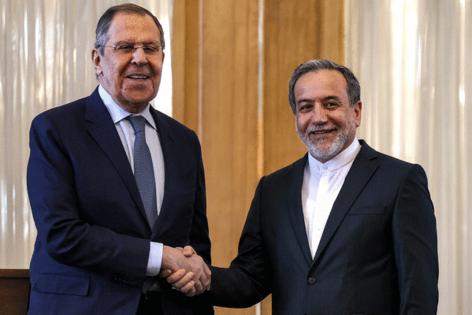Iran rejects direct nuclear talks with US under Trump policy
Published in Political News
Iran’s Foreign Minister Abbas Araghchi said his country won’t agree to direct nuclear talks with the United States while President Donald Trump persists with his hard-line policy against the Islamic Republic.
“We will not negotiate under pressure, sanctions or threats,” Araghchi said in a televised news conference alongside his Russian counterpart Sergei Lavrov in Tehran on Tuesday. Direct negotiations between Iran and the U.S. on the nuclear issue will be impossible “as long as maximum pressure is being applied in this manner,” Araghchi said.
Trump has vowed to squeeze Iran’s economy and target its oil exports as part of a return to the “maximum pressure” strategy that he deployed in his first term. That led to the 2018 U.S. withdrawal from a landmark international deal that limited Iran’s atomic activities in exchange for sanctions relief.
Iran’s stockpile of near weapons-grade enriched uranium has since surged. Araghchi said Iran will cooperate fully on its nuclear affairs — but only with “friends” China and Russia.
Since returning to office last month, Trump has said he wants Iran to agree to a new nuclear agreement, but Iran’s Supreme Leader Ayatollah Ali Khamenei dismissed the idea earlier this month, saying negotiating with the U.S. “won’t solve any of the country’s problems.”
Speaking alongside Araghchi, Lavrov said Russia will pursue diplomatic efforts to resolve the Iranian nuclear issue.
“We’re convinced that the tool of diplomacy remains,” Lavrov said. “It cannot be neglected — it must be used as effectively as possible without any threats and without hints at the possibility of certain forceful solutions.”
Iran and the U.S. haven’t had direct, formal ties since the 1979 Islamic revolution and previous negotiations that led to the 2015 nuclear deal took place through mediators. Araghchi didn’t mention whether indirect or mediated talks with the U.S. are still on the table.
Lavrov’s visit to Tehran comes as Trump aligns with Russia and President Vladimir Putin over its invasion of Ukraine, sparking strong criticism and concern from both Ukraine’s President Volodymyr Zelenskyy and much of Europe.
It’s unclear what impact the United States' pivot to Moscow will have on Putin’s alliance with Iran, which has deepened since the start of the war and has involved purchases of large amounts of Iranian drones and a plan to develop a major trading corridor using the Caspian Sea.
Araghchi said he and Lavrov discussed trade and transport ties and held detailed and “very good” discussions on the future of Syria and Gaza, adding that they both “strongly condemned” Trump’s plan to forcibly displace Palestinians from the territory.
_____
(With assistance from Henry Meyer.)
©2025 Bloomberg L.P. Visit bloomberg.com. Distributed by Tribune Content Agency, LLC.




























































Comments